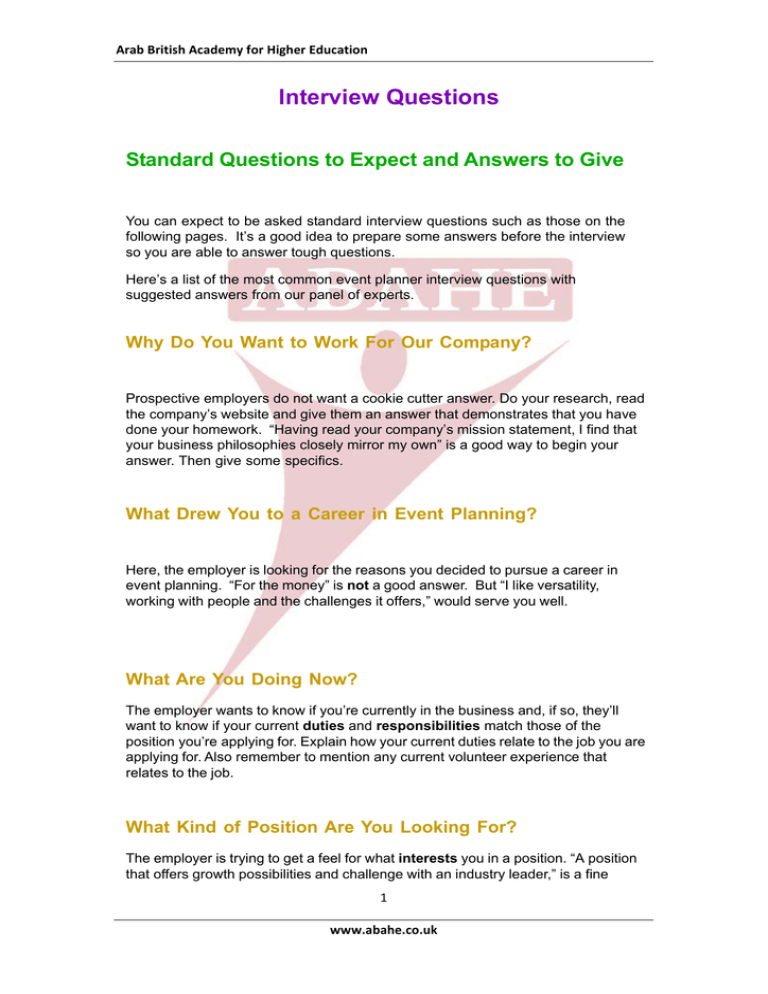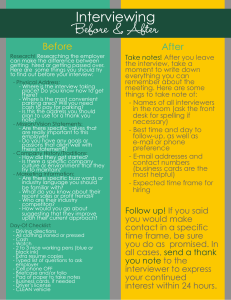
Arab British Academy for Higher Education Interview Questions
Standard Questions to Expect and Answers to Give
You can expect to be asked standard interview questions such as those on the
following pages. It’s a good idea to prepare some answers before the interview
so you are able to answer tough questions.
Here’s a list of the most common event planner interview questions with
suggested answers from our panel of experts.
Why Do You Want to Work For Our Company?
Prospective employers do not want a cookie cutter answer. Do your research, read
the company’s website and give them an answer that demonstrates that you have
done your homework. “Having read your company’s mission statement, I find that
your business philosophies closely mirror my own” is a good way to begin your
answer. Then give some specifics.
What Drew You to a Career in Event Planning?
Here, the employer is looking for the reasons you decided to pursue a career in
event planning. “For the money” is not a good answer. But “I like versatility,
working with people and the challenges it offers,” would serve you well.
What Are You Doing Now?
The employer wants to know if you’re currently in the business and, if so, they’ll
want to know if your current duties and responsibilities match those of the
position you’re applying for. Explain how your current duties relate to the job you are
applying for. Also remember to mention any current volunteer experience that
relates to the job.
What Kind of Position Are You Looking For?
The employer is trying to get a feel for what interests you in a position. “A position
that offers growth possibilities and challenge with an industry leader,” is a fine
1 www.abahe.co.uk Arab British Academy for Higher Education answer here.
What Did You Like Most About Your Last Job? Least? Why?
Now the interviewer is trying to discover what you don’t like. If you didn’t like a
certain responsibility at your previous or current job, and this responsibility is
required at the job you’re applying for, you could get passed over. But you have to
be honest if you want to find a job that you will love.
What Experience Do You Have With _____?
Depending on the company, they may want to know your experience with event
planning, budgeting numbers, customer service, working in teams, supervising,
juggling many projects at once, etc. Give specific examples from your
experience. Include any work experience, volunteer work, internship, or
education that demonstrates your skill in a particular area. For example, if you
haven’t done much budgeting for real events, but earned an A in an accounting
class where you had to prepare budgets – tell the inter- viewer. This is your
opportunity to show that you know your stuff.
What Are Your Strengths and Weaknesses?
Focus first on answering your strengths—that’s usually easier to answer. Think
about the duties and responsibilities of the job and answer accordingly. For
instance, “My ability to come in under budget is my greatest strength.”
Avoid talking in terms of weaknesses. Instead, turn the statement into a positive
one, by pointing out a personal goal you’d like to meet or an achievement you’d
like to earn. For example, instead of saying you have trouble managing your time,
you could state that one of your goals is to take a time management seminar to
make sure you are maximizing your potential. That answer tells the interviewer
two things. First, you have the strength of character to recognize a weakness;
and second, you have the will to do something positive about it.
Where Do You See Yourself in Five Years?
Sometimes employers ask this because they want to know whether you are
looking at their company for long-term employment or simply a short-term job “until
something better comes along.” Other employers want to judge your ability to plan
for the future. Most employers do not want to hear that in five years you hope to be
retired or plan to start your own event planning business. “In five years, I’d like to
have an advanced degree and hold a management position in this company,” is a
good possible answer.
How Do You Feel About Overtime?
Overtime and odd hours are part of event planning; it’s not a 9-to-5 job. What you
need to know, as the prospective employee, is how much overtime the company
would be asking for and if you’re willing to make that kind of time commitment.
Do You Have Any Questions For Us?
2 www.abahe.co.uk Arab British Academy for Higher Education “Yes!” is the appropriate answer here. Take your time and do some research so
you can ask very pointed questions. Interviewers want an interview to be
interactive, not just them sitting behind a desk spouting corporate rhetoric. Some
standard questions you might ask would be:
• What are you looking for in an employee?
• What would your expectations for me be during the first six months on
the job?
• What is your department/division’s current business plan and how would
I fit into that plan?
• What is it about your company that differentiates you from your
competition? Aside from those standard questions, you should also surf the
company’s website —specifically the “About Us” section or wherever you can find
press releases. The company’s annual report is also a good place to get
information — especially the first page, which is usually a recap of the previous
year.
Find something current the company is doing or has done and ask questions on
that subject. For example, “I read in one of your press releases that your
revenues are up 10 percent due to increasing international customers. Was this
part of a specific business plan and would this affect the way your department
conducts business?”
Behavioral Questions
Also be prepared to answer behavioral questions. These are questions that ask you
about an experience you had in the past, and require you to answer with a specific
real- life example. The interviewer might ask: “Tell me about a time you
experienced conflict with a co-worker. What happened, and how was it resolved?”
The interviewer will not be satisfied with a hypothetical answer about what you
“would” do in such a situation. They want to hear about an actual time you
experienced conflict. The purpose is not to see if you have ever had a conflict (they
expect you have); the purpose is to see how well you resolve difficult situations and,
if something did not work out in the past, what you learned from it.
Since you are applying for an event planning position, you can expect to hear
behavioral questions such as:
• Describe your most successful event so far. What did you do to make it a
success?
3 www.abahe.co.uk Arab British Academy for Higher Education • Describe an event where something went wrong. How did you solve
the problem?
Other Questions
You can expect interviewers to ask a variety of questions based on the position
and their personal preferences about what they want in an employee. For
example:
“What is it about your personality that makes you a good event
planner?”
– Dianne Chase, Pesident
A La Carte PR, Charlotte, NC
“How do you define being a member of a team?”
– Eugene Hardison, Assistant Director of Special Events
McCormick Place Convention Center, Chicago, IL
Prepare and practice answers to these and as many other questions as you can
brainstorm. If you are asked something you haven’t prepared for, try to answer as
honestly as possible. This will help ensure the position is a good fit for what you
are looking for. Plus, interviewers say they are turned off by applicants who tell
them what they think the interviewer wants to hear. It’s okay to say “I don’t know,”
just don’t make a habit of it.
You can find more advice on preparing for an interview and answering standard
interview questions at:
Monster.com Interview Center http://interview.monster.com
All Rights Reserved © Arab British Academy for Higher Education
4 www.abahe.co.uk



